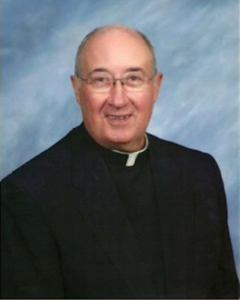Tagged: “forgiveness is a choice”
Sharing the Good News of Forgiveness!
Our founding board member, Dr. Robert Enright, has been busy with media interviews on forgiveness over the past months. Here is a listing of his interviews since December, 2023, starting with the most recent:
Live interview, The Drew Mariani Show (national), Relevant Radio, on the topic of betrayal, forgiveness, and self-forgiveness, March 27, 2024.
Interview with Darcy Sterling, “We Need to Talk” podcast, March 15, 2024.

Dr. Robert Enright
Interview with Julie Cruz, Well Wisconsin Radio Broadcast, March 13, 2024.
Interview with Laura Hearn, Flip It podcast, London, United Kingdom, March 12, 2024.
Interview with Rebecca Randall for a report in the John Templeton Foundation newsletter, March 4, 2024.
Live interview with Liz Saint John, KCBS radio, San Francisco, California, on the topic of forgiveness, December 27, 2023.
Interview with Julien Manuguerra-Patten, BBC’s Sideways program, United Kingdom, on the topic of holding grudges and forgiveness, December 11, 2023.
Live interview with Andy Moore, WORT-FM radio, Madison, Wisconsin, on the topic of forgiveness, December 8, 2023.
Live interview with Kate Archer Kent, “The Morning Show,” Wisconsin Public Radio, on the topic of forgiveness, December 6, 2023.
If you do a simple Google search for ‘Bob Enright Interview’, there are hundreds of thousands of hits! There are plenty of video, podcast, audio, and written interviews with Dr. Enright easily accessible across the internet and each of them helps shed light on forgiveness and its power to bring authentic peace and healing to people, communities, and the world. Check them out!
Dr. Enright discusses ‘Forgiveness is a Choice’ on Relationship Podcast
On April 2, 2024, Dr. Enright appeared on a one-hour podcast on YouTube, We Need to Talk with Dr. Darcy Sterling. Dr. Sterling is a New York City-based relationship therapist and host of E! Network’s Famously Single, who specializes in working with high-performance women who want to prioritize love and relationships.
Sterling describes her forgiveness journey that led her to interview Dr. Enright as follows on the YouTube video description:
“Years ago, I was gutted by a falling out with one of my siblings. It quickly became clear that we were on the verge of estrangement, and that impending loss brought me to my knees — I had just recovered from PTSD and was terrified of getting sucked into the black hole of trauma that I’d just come through.
Frantic for help, I found myself Googling a solution, and up came the term Forgiveness Therapy.
To be clear: I was not feeling forgiving. But I was feeling desperate. I did not want to revisit the darkness I’d just emerged from.
A book on forgiveness had recently been published by a professor named Robert Enright. In it he posits that forgiveness isn’t about cutting the other person slack. It’s a liferaft for people who feel wronged. Enright’s theory had been peer-reviewed — the gold standard in the field of psychology — so, despite my apprehension, I committed to following his program.
Today, my journey through forgiveness comes full circle in my conversation with the theorist himself, Dr. Robert Enright.
If you struggle with anger or are someone who holds grudges and you want to explore a solution, please listen to this episode.
In it, you’ll learn:
Why it makes sense if the thought of forgiving someone who wronged you makes you cringe.
The consequences of not forgiving.
How choosing to forgive puts you in control of your feelings.
How Enright’s program helped me to personally bypass a relapse of PTSD.”
Check out the interview below!
In Memoriam: A Tribute to Our Long-Time Board Member and Friend, Msgr. John Hebl
On March 11, 2024, our International Forgiveness Institute (IFI) lost our Board Member and friend, Msgr. John Hebl, who passed away at his home in Oxford, Wisconsin. He joined our IFI in 1994 and gave us 30 years of wonderful service with his wisdom and passion for forgiveness. He is an important figure in forgiveness science because he was the very first person, in the entire history of psychology, who did an empirically-based, peer-reviewed published study on a forgiveness intervention. In that article, published by the American Psychological Association’s journal, Psychotherapy, he screened 24 elderly women  who suffered injustices, mostly within the family and friendship contexts. He randomized the women into the experimental group, in which he brought them through our Process Model of Forgiveness, and the control group, in which social issues were discussed, such as the influence of senior citizens on society, attitudes toward aging, and family conflicts. Each lasted for eight sessions, once a week, for about an hour each time. Findings showed that the participants in the experimental group grew statistically significantly more than the control group participants in forgiving people who have hurt them. Those in the experimental group also grew statistically significantly more than the control group in their willingness to forgive others in general. The reference to this historical work is this:
who suffered injustices, mostly within the family and friendship contexts. He randomized the women into the experimental group, in which he brought them through our Process Model of Forgiveness, and the control group, in which social issues were discussed, such as the influence of senior citizens on society, attitudes toward aging, and family conflicts. Each lasted for eight sessions, once a week, for about an hour each time. Findings showed that the participants in the experimental group grew statistically significantly more than the control group participants in forgiving people who have hurt them. Those in the experimental group also grew statistically significantly more than the control group in their willingness to forgive others in general. The reference to this historical work is this:
Hebl, J., & Enright, R. D. (1993). Forgiveness as a psychotherapeutic goal with elderly females. Psychotherapy: Theory, Research, Practice, Training, 30(4), 658–667. https://doi.org/10.1037/0033-3204.30.4.658
Msgr. John was a dynamic, busy person as he led a Catholic parish and, at the same time, pursued successfully a doctoral degree in counseling psychology at the University of Wisconsin-Madison, where he did the groundbreaking research described above. Prior to this, he was a Brigadier General in the United States military service. I used to kid him, saying, “We all will have to address you as Father, Doctor, General Hebl!”
Rest in peace, Msgr. Hebl. Thank you for being a pioneer in forgiveness research, for serving people all these many years, and for contributing to a better world.
![]()
Finding Meaning As We Suffer
In recent months, the theme of suffering and finding meaning in that suffering has emerged more and more because of current events in the world, including the conflicts in Ukraine, in Israel and Gaza, and in Nigeria as examples. To reflect on the importance of finding meaning in suffering, we are reposting an essay first published here at the International Forgiveness Institute on October 15, 2013:
Let us start with the prophetic words of Shakespeare’s Macbeth, as he mourns the passing of Lady Macbeth in Act 5, Scene 5:

Image by Pexels.com
Tomorrow, and tomorrow, and tomorrow,
Creeps in this petty pace from day to day
To the last syllable of recorded time,
And all our yesterdays have lighted fools
The way to dusty death. Out, out, brief candle!
Life’s but a walking shadow, a poor player
That struts and frets his hour upon the stage
And then is heard no more. It is a tale
Told by an idiot, full of sound and fury,
Signifying nothing.
There is no meaning in life and therefore there is no meaning in suffering. To live and to suffer are meaningless. Yet, experience tells us that this kind of thinking is a dangerous illusion. Did Martin Luther King, Jr. have no meaning when he wrote his Letter from the Birmingham jail? Did Maximilian Kolbe see no meaning in life when he asked the Nazis to let him take the place of a condemned man who had a family? Whether one’s beliefs are in God or in random variations generated by mutations, we are either made for or have evolved toward finding meaning in our life. The skeptic would say that my point is a happy illusion: Yes, we need to believe this, but we do so just to stay alive; it is adaptive to think fairytale thoughts.
Yet, what else in nature can you identify that is so very important and at the same time is an illusion? I can think of nothing. If finding and having meaning is tied to our well-being, then there must be something to it. The psychiatrist Viktor Frankl, who survived Auschwitz (which Maximilian Kolbe chose not to survive for a higher good of protecting another person), observed this: Only those who survived Auschwitz found meaning in the profound suffering endured there. Those who found meaninglessness died. Finding meaning in this case was tied to positive, concrete outcomes. There was a need (to find meaning) that was fulfilled (surviving and even thriving). Can you think of any other real need that is not tied to something real that can fulfill it? If not, then it seems reasonable to say that we have real needs with real fulfillments and finding meaning and achieving the state of thriving are concretely, really linked together without illusion.
When we are treated deeply unjustly by others, we suffer. If we have come, through wisdom, to know the meaning of life, then we will find meaning in our suffering. If we find meaning in both life and suffering, we have the foundation to forgive well and to survive well the cruelty against us.
Sound and fury, signifying nothing? Please be careful in so concluding.
![]()
Is Forgiveness Always Appropriate When Faced with Serious Injustices?
Is forgiveness always appropriate when there is a deep unfairness? First, let’s examine the response a little more. When we ask this question, are we inquiring about a specific person or about the virtue of forgiveness itself? Here is where there is a crucial difference.

Image by Pexels.com
Since forgiveness is a moral virtue, we should ask our question of all virtues if our attention is on the virtue itself. As we broaden our view to focus on all moral virtues, we can consider the question’s opposite: For example, when is a quest for justice, one of the moral virtues, not appropriate? Put another way, can you picture a situation in which you might be arrested for intentionally acting in a just way? Would people condemn themselves for acting fairly? If not, then it appears to be the case that justice is always fitting in every situation. Is there ever a time when patience is inappropriate? How about showing kindness? I can hear someone say something like, “Well, I won’t be kind if someone is hitting me over the head with a frying pan.” I agree that your leaving the abuse is good because it is a protection for you. As a second possible response, you certainly are entitled to attempt removing the frying pan from the person’s grasp. You can act in either situation with kindness. Kindness is appropriate even in this instance. If kindness is used with other virtues (justice, courage, temperance) to help save the individual from doing the head-banging, then that is acceptable in the sense of being morally good.
My argument is that since all virtues are centered on the morally beneficial aspects of human interaction, then acting morally is always appropriate, and practicing forgiveness is one of these moral virtues.
The second aspect of the question (Is forgiveness always appropriate?) asks about the psychological suitability of practicing the virtue for any given individual. Does forgiveness make sense for any particular person all the time? This time, the answer is no, it is not always appropriate for the following reasons: a) the offended person may be too shocked by what happened to be ready to offer forgiveness at this time; b) the offended person may need to learn more about forgiveness to exercise forgiveness properly rather than some false form of it; and c) forgiveness is a supererogatory virtue that is not demanded of any one person at a particular time because it is not a virtue that society demands. It is the person’s decision to extend forgiveness or not on any particular occasion.
Is forgiveness always appropriate?
Yes, if we are talking about the quality of this term, specifically its quality of being a moral virtue.
Must, then, all people turn immediately to forgiveness when treated unjustly?
No, if we are discussing the psychological makeup of a certain individual, including both this person’s degree of hurt and understanding of forgiveness, as well as the specifics of the injustice, such as its gravity, duration, and time since it happened. Some people need time to be angry, to sort out what forgiveness is, and then move forward with it when the person is ready.
![]()



